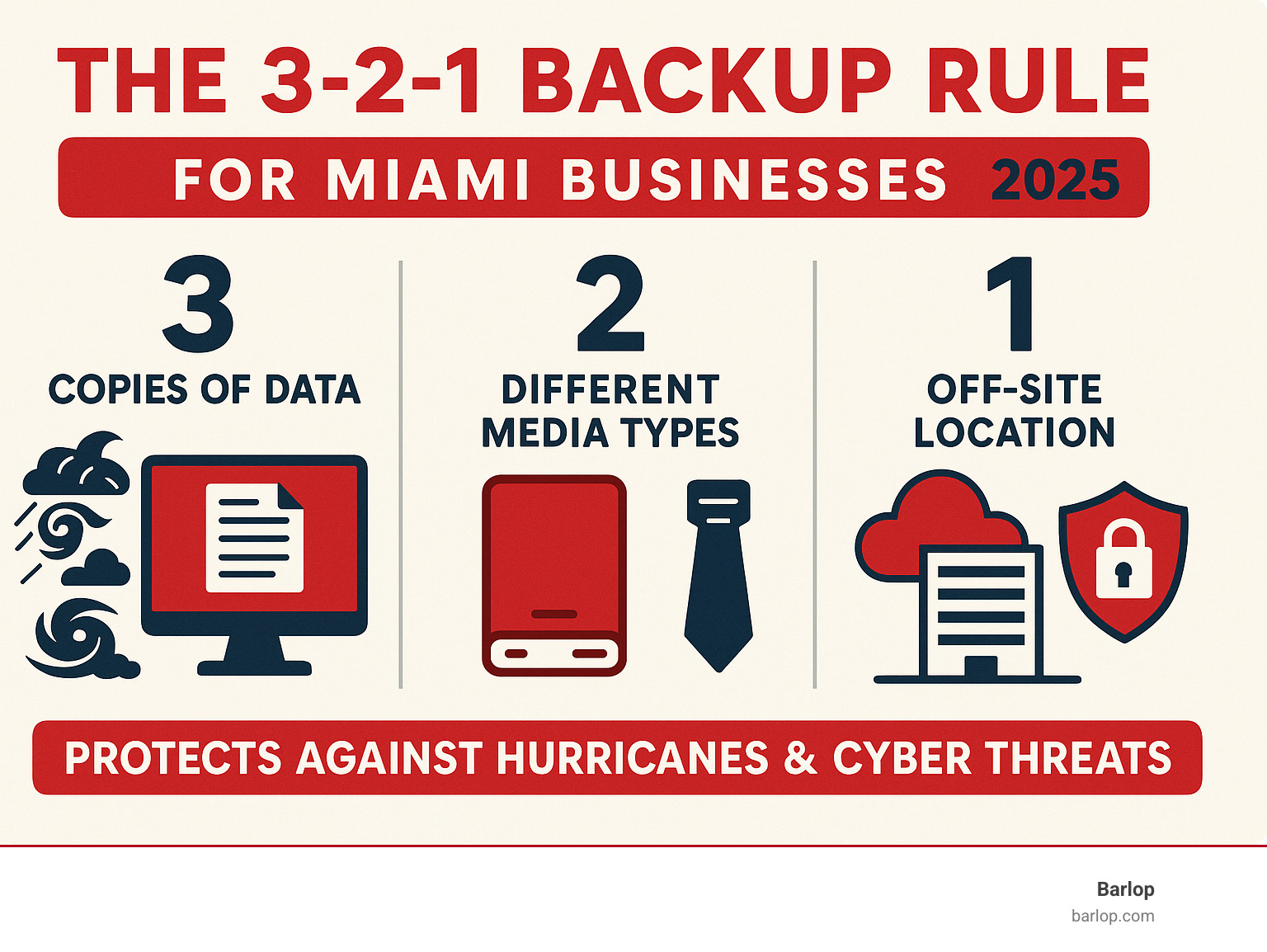Data backup Miami services are more critical than ever for businesses in South Florida’s thriving tech hub. With over 8,000 technology companies now calling the Miami-Dade area home, protecting your digital assets isn’t just smart business – it’s essential for survival.
Here’s what you need to know about data backup solutions in Miami:
- Cloud Backup: Scalable, off-site storage with remote access capabilities
- On-Premise Backup: Local control with faster recovery times for immediate needs
- Hybrid Solutions: Combines cloud and local backup for maximum protection
- Managed Services: Full-service backup with monitoring and maintenance included
- Disaster Recovery: Complete business continuity planning for hurricane season
Miami’s unique position creates both opportunities and challenges for local businesses. The city serves as a gateway to Latin America and ranks among the world’s top five most-connected cities. But this same connectivity that drives business growth also makes companies attractive targets for cyber attacks.
Add Florida’s hurricane season to the mix, and the stakes get even higher. One storm, one ransomware attack, or one hardware failure could wipe out years of work in minutes.
The good news? Miami’s world-class data center infrastructure and internet exchange points make it easier than ever to implement robust backup solutions. Whether you’re running a small law firm in Coral Gables or managing operations for a growing company in Doral, the right backup strategy can protect your business and keep you running no matter what hits.

Why Data Backup is Critical for Miami’s Booming Economy
Miami isn’t just about sun, sand, and salsa dancing anymore. Our city has transformed into a serious economic powerhouse, and the numbers tell an impressive story. The tri-county area of Miami-Dade, Broward, and Palm Beach now hosts 8,167 technology businesses, ranking us 12th nationally. That’s a lot of servers humming and data flowing through our tropical paradise.

What makes Miami truly special is our role as the gateway to Latin America. We’re not just a tech hub – we’re a financial center and international trade powerhouse connecting the Americas, Europe, and beyond. Our data centers sit at the heart of one of the world’s largest internet exchange points, making us one of the top five most-connected cities globally.
This incredible connectivity is fantastic for business, but it also paints a target on our backs. When you’re this well-connected and handling this much valuable data, cyber criminals take notice. Every thriving business in Brickell, every growing startup in Wynwood, and every established company in Coral Gables becomes a potential target.
Then there’s Mother Nature. Living in paradise comes with a price during hurricane season. Between June and November, we’re constantly watching weather maps and hoping that next storm takes a different path. Power outages, flooding, and physical damage aren’t just inconveniences here – they’re annual possibilities that can make your on-site data completely inaccessible.
This is exactly why data backup Miami solutions aren’t optional for local businesses. They’re essential for survival in our unique environment where digital threats and natural disasters both pose real risks to business continuity.
The High Cost of Data Downtime
Picture walking into your office tomorrow morning and finding that every customer record, financial file, and piece of operational software is completely inaccessible. Your team stares at blank screens while phones ring with frustrated clients. This nightmare scenario plays out more often than you’d think.
The financial impact of data loss goes far beyond the immediate crisis. Studies show that businesses experiencing significant data loss face operational disruption that can last weeks or months. During this time, productivity grinds to a halt, projects get delayed, and customers lose patience. The reputational damage often outlasts the technical recovery.
Ransomware attacks have become particularly nasty in recent years. These digital extortionists encrypt your data and demand payment for the key to open up it. Even if you pay the ransom – which experts strongly advise against – there’s no guarantee you’ll get your data back. Many businesses that refuse to pay find they’ve lost years of irreplaceable information.
The ripple effects extend beyond your immediate operations. Clients question your reliability, partners worry about their own data security when working with you, and employees feel stressed about job security. Recovery from a major data loss event often takes years, not months.
Meeting Compliance in a Regulated Hub
Operating in Miami’s business environment means navigating a maze of regulatory requirements that would make a hurricane tracking map look simple. Our city’s role as a financial and international trade center means many local businesses must meet strict compliance standards.
Healthcare providers must follow HIPAA regulations for patient data protection. Any business processing credit card transactions needs PCI-DSS compliance. Financial institutions face multiple regulatory frameworks, while public companies must meet Sarbanes-Oxley requirements. Each of these standards has specific rules about how data must be stored, protected, and backed up.
The good news is that Miami’s data center infrastructure has evolved to meet these demanding requirements. Local facilities undergo rigorous annual audits and maintain certifications for various compliance standards. When choosing a data backup solution, working with providers who understand these regulatory landscapes isn’t just helpful – it’s essential.
Compliance violations carry hefty financial penalties, but the real cost often comes from lost business relationships. Clients in regulated industries simply can’t work with vendors who don’t meet security standards. A single compliance failure can close doors that took years to open, making secure data handling a competitive necessity rather than just a legal requirement.
A Guide to Data Backup Miami Solutions
Choosing the right data backup Miami solution for your business isn’t like picking a flavor of ice cream – there’s no “one scoop fits all” approach. Your Miami business has unique needs, whether you’re a small accounting firm in Coral Gables or a growing tech startup in Brickell.
The key is understanding your business requirements first. How much data can you afford to lose if something goes wrong? That’s your Recovery Point Objective (RPO). How quickly do you need to be back up and running? That’s your Recovery Time Objective (RTO). And how often should you back up your data? The answer depends on how fast your business data changes.
Let’s break down your three main options and what each brings to the table:
| Backup Solution | Cost | Scalability | Security | Disaster Recovery Suitability |
|---|---|---|---|---|
| Cloud Backup | Variable (pay-as-you-go) | High | High (provider’s security) | Excellent (off-site) |
| On-Premise Backup | Upfront (hardware) | Moderate | High (your control) | Moderate (vulnerable to local disaster) |
| Hybrid Backup | Moderate (mix of both) | High | High (layered approach) | Excellent (redundancy) |
Cloud Backup: Scalable and Accessible
Think of cloud backup as renting storage space in a high-security vault that happens to be accessible from anywhere in the world. Your data gets stored on remote servers managed by experts who eat, sleep, and breathe data protection.
The beauty of cloud storage lies in its flexibility. Start small and grow as your business expands – no need to buy expensive hardware upfront. This pay-as-you-go model means you’re only paying for what you actually use, which is music to any business owner’s ears.
Miami businesses have a particular advantage here. Our city’s incredible global connectivity – ranking among the top five most-connected cities worldwide – means your data can zip to secure, world-class data centers faster than you can say “cafecito.” Whether it’s SaaS backup solutions or simple file storage, you’ll have remote access to your information from anywhere, which becomes invaluable during hurricane season or other local disruptions.
The scalability factor really shines as your business grows. Need more storage next month? Done. Expanding to new locations? Your data backup Miami solution grows with you seamlessly.
On-Premise (Local) Backup: Control and Speed
Sometimes you want your data close to home, like keeping your important documents in your office safe rather than a bank vault across town. On-premise backup means storing your data on local servers or NAS devices right there in your building.
The biggest advantage? Speed and control. When you need to restore files, you’re pulling them from hardware sitting just down the hall, not downloading from the cloud. For businesses with large datasets or tight recovery time requirements, this can be a game-changer.
You’ll have direct control over your physical security, maintenance schedules, and access permissions. No waiting for a third party to respond – you’re in the driver’s seat.
The trade-off is responsibility. Your team handles the hardware maintenance, upgrades, and physical security. Plus, local backups share the same risks as your primary systems – hurricanes, floods, power outages, and theft can affect both your main operations and your backup simultaneously.
Hybrid Backup: The Best of Both Worlds
Why choose between chocolate and vanilla when you can have both? Hybrid backup combines the speed of local storage with the disaster protection of cloud backup, creating a comprehensive safety net for your business.
This approach creates powerful redundancy through the synergy of cloud and local storage. Your most critical data gets stored both locally for quick access and in the cloud for disaster recovery. It’s like having a spare key both hidden under the doormat and with your trusted neighbor.
Many Miami businesses use data tiering with their hybrid approach – frequently accessed files stay local for speed, while older or less critical data moves to cheaper cloud storage. This disaster recovery strategy ensures you’re protected against both local disasters like hurricanes and broader issues like ransomware attacks.
The layered approach gives you flexibility in how you recover from different types of incidents. Small, day-to-day file recoveries happen quickly from local storage, while major disasters trigger your off-site cloud recovery plan.
How to Choose the Right Data Backup Provider in Miami
Finding the right data backup Miami provider isn’t just about storage space and pricing. You’re looking for a true partner who understands your business needs and can keep you running when things go wrong. Think of it like choosing a doctor – you want someone skilled, trustworthy, and available when you need them most.

The decision process starts with asking the right questions. When you’re evaluating potential providers, dig deep into their security practices and compliance standards. Find out exactly what their service level agreements promise for recovery times – because when your data is gone, every minute counts.
Local presence matters more than you might think, especially here in Miami where hurricanes can knock out communications for days. Ask about their disaster recovery capabilities and how they handle our unique climate challenges. You’ll also want to understand their pricing model completely, including any hidden fees that might surprise you later.
Most importantly, ask for real examples of how they’ve helped businesses similar to yours. A provider who’s successfully guided a Miami law firm through a ransomware attack or helped a Doral manufacturing company recover from hurricane damage brings invaluable experience to your partnership.
Security and Encryption Standards
Your business data deserves the same protection as your most valuable physical assets. When evaluating providers, security standards should be your first concern, not an afterthought.
Look for end-to-end encryption that protects your data whether it’s traveling to the backup location or sitting in storage. The best providers use military-grade encryption and maintain strict access controls that limit who can see your information.
Physical security matters just as much as digital protection. Top-tier data centers employ 24/7 building security, multiple layers of access control, and comprehensive surveillance systems. Regular audits like SSAE 18 SOC compliance, ISO 27001 certification, and PCI-DSS validation show that a provider takes security seriously enough to have it verified by independent experts.
Ransomware protection has become essential in today’s threat landscape. Your provider should have specific strategies for detecting, preventing, and recovering from these attacks. Some even offer immutable backups that can’t be altered or deleted by cybercriminals.
Support and Expertise
When your data is at risk, you don’t want to be stuck on hold with a call center halfway around the world. Local Miami presence brings real advantages that remote-only providers simply can’t match.
Having technicians who understand South Florida’s unique challenges – from hurricane season to the specific compliance requirements of our finance and healthcare industries – makes a huge difference. Local experts can provide on-site support when you need it most and offer faster response times during emergencies.
Look for providers with proven disaster recovery expertise, not just backup services. There’s a big difference between storing your data and having a comprehensive plan to get your business running again after a disaster. The best providers offer proactive monitoring through dedicated network operations centers that watch your systems around the clock.
Experience with businesses like yours matters too. A provider who’s helped Miami medical practices maintain HIPAA compliance or guided international trade companies through complex data regulations brings knowledge that generic providers simply don’t have.
Understanding the Costs
Data backup pricing can seem like a maze of confusing terms and hidden fees, but it doesn’t have to be. Understanding the cost structure upfront helps you budget properly and avoid unpleasant surprises.
Most providers charge based on storage fees calculated per gigabyte or terabyte of data. Some use per-device pricing, while others focus on bandwidth costs for transferring your information. Setup fees are common but shouldn’t be excessive.
The key is looking beyond the initial quote to understand your total cost of ownership. This includes potential scaling costs as your business grows, ongoing support fees, and the value of time saved during recovery situations. A slightly more expensive solution that gets you back online hours faster often pays for itself many times over.
Transparent pricing should be the standard, not the exception. The best providers offer clear estimates that include all costs upfront, with no hidden fees or surprise charges later. When comparing options, factor in the peace of mind that comes with knowing exactly what you’ll pay and what you’ll receive in return.
The cheapest option rarely provides the best value when your business’s survival depends on quick, reliable data recovery. Focus on finding the right balance of features, support, and cost for your specific needs.
From Backup to Business Continuity: Your Miami Disaster Recovery Plan
For Miami businesses, data backup is just the starting point of something much bigger: creating a complete disaster recovery and business continuity plan. Living in South Florida means we face unique challenges that most other cities don’t have to worry about. Hurricane season isn’t just a weather forecast – it’s an annual reminder that we need to be ready for anything.
Think about what happens when a major storm hits our area. We’re not just dealing with lost files on a computer. Power grids go down for days or weeks. Office buildings flood. Roads become impassable. Your entire team might be scattered across the region dealing with their own storm damage.
This is where disaster recovery planning goes way beyond simple data backup Miami solutions. We’re talking about having a complete roadmap for how your business keeps running when everything around you stops working. It’s about making sure you can serve your customers, pay your employees, and keep your doors open even when Mother Nature has other plans.
A solid business continuity plan considers every aspect of your operation. How will your team communicate if cell towers are down? Where will you work if your office is damaged? How quickly can you access critical systems and data? These aren’t comfortable questions to think about, but they’re essential for any Miami business that wants to survive and thrive.
The Role of Off-Site Backups
3-2-1 backup rule we talked about earlier? This is where it really shines. Having your data stored somewhere far away from Miami becomes absolutely critical when we’re facing regional disasters like hurricanes.
Geographic redundancy means your business data lives in multiple locations that won’t all be hit by the same storm. Miami’s incredible connectivity and world-class data centers are fantastic for day-to-day operations, but smart businesses also keep copies of their critical information in data centers outside the hurricane zone.
This strategy isn’t just about paranoia – it’s about peace of mind. When Hurricane Irma or Dorian is bearing down on South Florida, you want to know that your customer records, financial data, and operational systems are safely stored hundreds of miles away. That geographic separation means you can focus on keeping your team safe instead of worrying about whether your business will survive the storm.
The beauty of modern data backup Miami solutions is that this geographic redundancy happens automatically. Your data gets copied to secure facilities across multiple states, creating a safety net that protects against both local disasters and regional catastrophes.
Testing Your Recovery Plan
Here’s something that might surprise you: most businesses that have disaster recovery plans have never actually tested them. It’s like having a fire extinguisher that you’ve never checked to see if it works.
Regular testing isn’t just a good idea – it’s the difference between a plan that saves your business and a plan that fails when you need it most. These recovery simulations show you exactly how long it takes to get back up and running, what steps might be missing from your procedures, and which team members need additional training.
During these drills, you’ll find things you never expected. Maybe that backup system takes twice as long to restore as you thought. Perhaps key employees don’t know their roles in the recovery process. Or you might find that some critical data wasn’t being backed up properly.
The goal isn’t to create a perfect plan on the first try. It’s to continuously improve your disaster recovery strategy through regular testing and updates. Each simulation makes your business more resilient and better prepared for whatever challenges come your way.
Smart Miami businesses schedule these tests during slower periods and treat them as investments in their future stability. After all, the time spent testing your recovery plan today could save you weeks of downtime when a real disaster strikes.
Frequently Asked Questions about Data Backup in Miami
Miami businesses often have questions about protecting their digital assets. Having worked with countless companies across South Florida, we’ve noticed the same concerns come up repeatedly. Let’s tackle the most common questions we hear.
How often should my Miami business back up its data?
The answer depends on how much data you can afford to lose if something goes wrong. This concept is called your Recovery Point Objective (RPO), and it varies dramatically from business to business.
Think about it this way: if your business processes financial transactions all day long, losing even an hour of data could be catastrophic. You’d need continuous data protection or incremental backups every 15 to 30 minutes. But if you’re a law firm that mainly works with documents that don’t change frequently, daily backups might work just fine.
Most Miami businesses find success with a layered approach. Daily incremental backups capture the changes from each day, while weekly differential backups provide a broader safety net. Monthly full backups ensure you have complete system images available.
Critical data that changes constantly needs frequent backup frequency. Less dynamic information can follow a more relaxed schedule. The key is matching your backup schedule to your business’s actual risk tolerance and operational needs.
What’s the difference between data backup and disaster recovery?
This question comes up in almost every conversation we have with business owners, and for good reason. These terms get thrown around interchangeably, but they’re actually quite different.
Data backup is like having a spare key to your house. It’s a copy of your information stored safely somewhere else. When you lose a file or your server crashes, you can restore it from your backup. It’s a crucial component of your overall protection strategy.
Disaster recovery is your entire emergency response plan. It’s not just about getting your data back – it’s about getting your whole business back on its feet. This includes your Recovery Time Objective (RTO), which determines how quickly you need to be operational again.
A comprehensive disaster recovery strategy covers everything from backup restoration to alternative work locations, communication plans, and staff responsibilities during a crisis. Your backup provides the raw materials, but disaster recovery is the blueprint for putting everything back together and maintaining business continuity.
Can I just use a consumer cloud service for my business backups?
We get this question a lot, especially from smaller businesses trying to keep costs down. While services like Google Drive or Dropbox seem convenient and affordable, they’re really not designed for serious business data protection.
Consumer cloud services lack the business-grade features your company needs. They don’t offer the security differences that matter for commercial data, like advanced encryption standards or detailed access controls. If your business handles sensitive information or needs to meet compliance issues like HIPAA or PCI-DSS requirements, consumer services simply won’t cut it.
The scalability limitations become apparent as your business grows. Consumer services often cap storage amounts or charge premium rates for larger volumes. They also lack centralized management tools, detailed reporting capabilities, and the kind of dedicated support you need when disaster strikes.
For true data backup Miami businesses can rely on, you need enterprise-grade solutions designed specifically for commercial use. These offer robust security protocols, compliance certifications, and service level agreements that actually protect your business interests.
Secure Your Miami Business’s Future Today
Miami’s tech boom isn’t slowing down anytime soon. With over 8,000 technology businesses calling our area home and our position as one of the world’s most connected cities, the digital stakes have never been higher. Every day you wait to implement a solid data backup Miami strategy is another day your business sits vulnerable to ransomware attacks, hurricane damage, or simple hardware failures that could wipe out years of work.
We’ve walked through the essential elements of protecting your business data in our unique South Florida environment. From understanding the true cost of downtime to navigating compliance requirements like HIPAA and PCI-DSS, the message is clear: data backup isn’t just about technology anymore. It’s about survival.
The beauty of Miami’s infrastructure means you have world-class options at your fingertips. Whether you choose cloud backup for its scalability, on-premise solutions for speed and control, or a hybrid approach that gives you the best of both worlds, the key is taking action. Remember the 3-2-1 rule we discussed: three copies of your data, two different storage types, and one copy stored off-site. It’s simple, proven, and could save your business.
But here’s what really matters: having a plan that works when everything goes wrong. Hurricane season doesn’t send a courtesy email before it arrives. Cybercriminals don’t schedule their attacks for convenient times. That’s why testing your disaster recovery plan isn’t optional – it’s what separates businesses that survive from those that don’t.
Your Miami business deserves protection that matches its ambitions. Don’t let a preventable disaster derail your success story. Protect your business with our comprehensive IT services and join the ranks of Miami companies that are prepared for whatever comes their way.
The question isn’t whether you can afford to invest in proper data backup. It’s whether you can afford not to.





